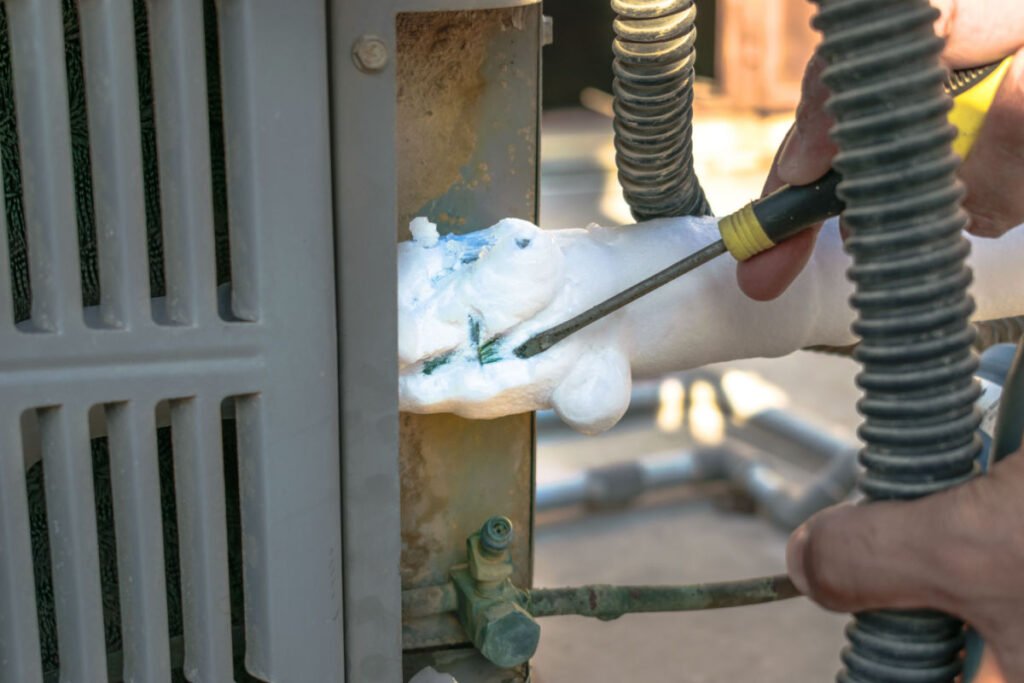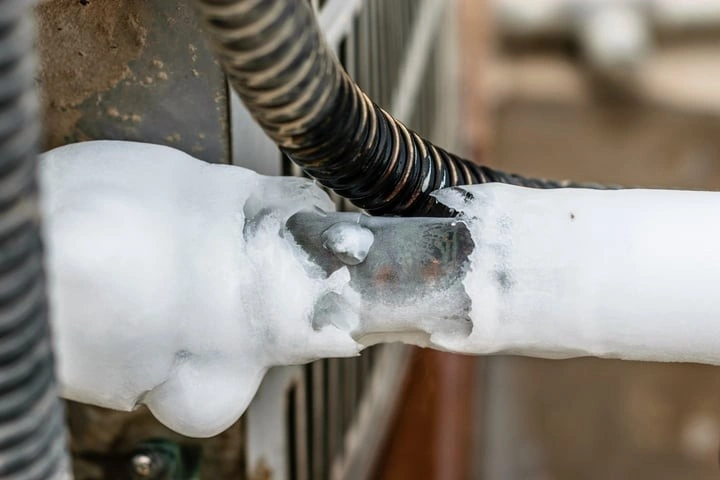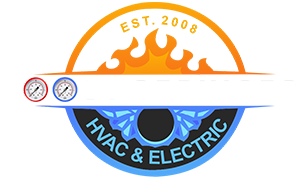Summertime in Pasadena can be quite warm, and the last thing you want is your air conditioner freezing up when you need it the most. This issue not only leaves you hot and uncomfortable but can also lead to concerns about potential damage to your AC unit. Understanding why this happens and how to prevent it is crucial for maintaining a cool and comfortable environment in your home or business. In this article, we’ll explore the common causes of AC freezing up and what you can do to address these issues. By staying informed, you can take proactive steps to ensure your AC system operates efficiently throughout the hot season.

Table of Contents
One of the most prevalent causes of an outside AC unit freezing up is insufficient airflow. When your air conditioner cannot get enough air flowing through it, the evaporator coil can get too cold and freeze over. This freezing can severely compromise the efficiency of your AC unit, leading to increased energy consumption and higher utility bills. Insufficient airflow can happen for several reasons, each needing attention to ensure smooth operation.
- Dirty Air Filters: A clogged air filter can severely restrict airflow, leading to a range of problems, including freezing. Regularly checking and replacing your air filters is one of the easiest ways to prevent your AC from freezing. Air filters should typically be checked monthly and replaced every three months, though this can vary based on usage and environmental conditions.
- Blocked Vents: Ensure that all air vents are open and unobstructed by furniture or other objects. Good airflow is essential for proper AC function. Rearranging furniture or removing obstructions can significantly improve the efficiency and effectiveness of your cooling system.
- Fan Issues: The blower fan is responsible for moving air over the evaporator coil. If it’s malfunctioning, it can lead to freezing. A fan that is not spinning at the correct speed or is not functioning at all can drastically reduce airflow, necessitating professional inspection and repair.
Quick Fix
To quickly address insufficient airflow, start by checking and replacing your air filters. Make sure all vents are open and unblocked. If the fan is the issue, you may need to call a professional for repair. Additionally, conducting a routine inspection of vents and ducts can help identify potential blockages or issues with airflow that may not be immediately apparent.
2. Low Refrigerant Levels

Refrigerant is crucial for the cooling process in your air conditioning system. Low refrigerant levels can cause the pressure in your system to drop, leading to the evaporator coil freezing. This issue is often caused by leaks in the system, which can be challenging to detect without professional help. The cooling efficiency of your AC unit is directly tied to the proper levels of refrigerant, making it vital to address any discrepancies promptly.
Identifying the Problem
If you notice your AC unit freezing and suspect low refrigerant levels, you might also experience several other symptoms. Decreased cooling efficiency is a common sign, indicating that your unit is struggling to maintain the set temperature. Additionally, hissing or bubbling noises from the AC unit can be indicative of refrigerant leaks, as these sounds suggest escaping gases. Ice forming on the refrigerant lines is another clear sign that refrigerant levels are not adequate, and immediate attention is required.
Quick Fix
Unfortunately, low refrigerant issues require a professional HVAC technician to locate and fix any leaks, and to recharge the system with the proper amount of refrigerant. It’s important not to attempt this on your own, as handling refrigerants requires specific training and certification. By seeking professional assistance, you can ensure that the problem is resolved safely and effectively, preventing future issues.
3. Thermostat Issues
A malfunctioning thermostat can cause your AC to overwork, leading to freezing. If the thermostat is not accurately reading the indoor temperature, it may cause the AC to run longer than necessary, dropping the temperature of the evaporator coil below freezing. This overworking not only risks freezing the unit but also increases wear and tear, potentially shortening the lifespan of your AC system.
Troubleshooting Thermostat Problems
There are several steps you can take to troubleshoot thermostat problems. Start by checking the thermostat settings to ensure it is set to the correct temperature and mode. Incorrect settings can lead to unnecessary strain on your AC system. If your thermostat is battery-operated, try replacing the batteries, as dead or weak batteries can cause inaccuracies in temperature readings. Additionally, a calibration check can ensure the thermostat is properly calibrated. If you suspect it’s not, a professional can help recalibrate it to ensure accurate temperature control.
Quick Fix
If you suspect thermostat issues and simple fixes like battery replacement don’t work, consider consulting with an HVAC professional to inspect or replace the thermostat. A professional evaluation can identify whether the thermostat requires recalibration or if a complete replacement is necessary, ensuring your AC system operates efficiently.
4. Dirty Evaporator Coils
Over time, dirt and debris can accumulate on the evaporator coils, which can interfere with the heat absorption process. This buildup can cause the coils to freeze over, as there is insufficient heat being absorbed to maintain the proper temperature. Dirty coils not only risk freezing but also decrease the overall efficiency of your AC unit, leading to increased energy consumption and higher utility costs.
Preventive Measures
Regular maintenance is key to preventing dirty evaporator coils. Schedule annual maintenance with an HVAC professional to ensure your coils are clean and functioning optimally. Regular professional cleaning can prevent dirt and debris from accumulating, maintaining the efficiency and lifespan of your system. For those inclined to perform some maintenance themselves, DIY cleaning can be effective. You can gently clean the coils with a soft brush or a vacuum cleaner to remove dust and debris, but be cautious to avoid damaging the coils during the process.
Quick Fix
For a quick DIY solution, carefully clean the coils with a soft brush if they are accessible. However, for a thorough cleaning, it’s best to contact a professional technician. Professional cleaning ensures that all parts of the system are addressed, reducing the risk of future freezing and enhancing overall performance.
5. Drainage Problems
Your AC unit removes moisture from the air as it cools, and this moisture is supposed to drain away. If the drainage system is blocked or malfunctioning, the excess moisture can freeze on the coils. This can lead to a range of problems, including increased humidity indoors and potential water damage if the issue persists.
Signs of Drainage Issues
Several signs can indicate drainage issues with your AC unit. Water pooling around the indoor unit is a clear sign that the drainage system is not functioning properly. Additionally, musty odors from the vents can suggest mold or mildew growth due to excess moisture. Increased humidity indoors, despite the AC running, is another indicator that drainage problems need to be addressed promptly.
Quick Fix
Check the condensate drain for clogs and clear any blockages you find. Regularly inspecting and cleaning the condensate drain can prevent many common drainage issues. If the problem persists, a professional can help assess and fix any drainage system issues, ensuring your AC system continues to function efficiently.
Conclusion on the Common Causes of AC Freezing Up

Understanding the common causes of AC freezing up can help you prevent issues with your AC and ensure your unit operates efficiently, especially during the hot Pasadena summers. Regular maintenance and prompt attention to potential problems can prevent costly repairs and extend the life of your air conditioning system. Whether you’re a community-based entrepreneur aiming to maintain a reliable business environment or a busy working-class American seeking quick solutions, keeping your AC in top condition is essential. Addressing issues before they escalate not only saves money but also ensures a comfortable indoor climate.
By maintaining your AC unit and addressing issues promptly, you can ensure a cool and comfortable environment in your home or business, no matter how high the temperature rises outside. Should problems persist, don’t hesitate to reach out to a trusted HVAC professional for assistance. Their expertise can provide peace of mind, ensuring that your cooling system is ready to handle the demands of the season efficiently and effectively.
Common Questions — Common Causes of AC Freezing Up
What are the most common causes of an AC freezing up?
The usual culprits are restricted airflow, low refrigerant due to a leak, dirty evaporator or condenser coils, blower or fan problems, thermostat or control issues, and running the system when outdoor temperatures are too low.
How does restricted airflow make my AC freeze?
Poor airflow prevents warm indoor air from passing over the evaporator coil, allowing coil temperature to drop below freezing. Moisture then turns to ice and expands the freeze across the coil and refrigerant lines.
Which airflow problems should I check first?
Start with these items:
- Dirty or incorrectly sized air filter
- Closed or blocked supply and return vents
- Collapsed, kinked, or undersized ducts
- Furniture or rugs covering returns
Can low refrigerant cause the evaporator to ice over?
Yes. A refrigerant leak lowers pressure and temperature in the evaporator, pushing it below 32°F. The coil freezes, airflow drops further, and the system may shut down to prevent damage.
Do dirty coils contribute to freezing?
Yes. Dirt on the evaporator coil insulates the surface and restricts heat transfer, while a clogged condenser coil raises system pressures and disrupts refrigerant balance—both conditions can lead to icing.
Can a bad blower motor or fan cause icing?
Absolutely. A failing indoor blower, weak capacitor, or incorrect fan speed reduces airflow across the evaporator coil, increasing the chance of a freeze-up.
Could thermostat settings be part of the problem?
Yes. Very low setpoints, miscalibrated sensors, or continuous “Fan On” with poor cooling can mask issues until icing is visible. Proper setpoints and verified sensor placement help prevent freeze-ups.
Is running AC during cool nights a cause of freezing?
It can be. When outdoor temperatures drop too low, system pressures fall and the evaporator can dip below freezing. Night cooling with open windows or raising the setpoint can help.
What are the warning signs that my AC is freezing?
Look for weak or no airflow from vents, warm air after a short cool period, visible frost or ice on the indoor coil or copper lines, gurgling or hissing noises, and higher energy usage with poor comfort.
What should I do immediately if I see ice on the AC?
Turn cooling off to prevent compressor damage and set the fan to Auto. Do not chip the ice. Let it thaw naturally, then replace the filter, open all vents, and schedule a professional inspection if icing returns.
Which maintenance steps help prevent freeze-ups?
Focus on these basics:
- Change filters every 30–60 days during heavy use
- Keep supply and return vents open and clear
- Have coils cleaned during annual tune-ups
- Seal and insulate accessible ductwork
- Verify correct refrigerant charge and fan speeds
When do I need a professional for a freezing AC?
Call a technician if icing repeats after a thaw and filter change, if you suspect a refrigerant leak, if the blower or outdoor fan stalls, if coils are heavily fouled, or if breakers trip during operation.
Can an oversized system cause frequent freeze-ups?
Yes. Oversized units short-cycle, limiting dehumidification and causing coil temperatures to drop rapidly. Proper sizing verified by a load calculation helps avoid icing and comfort issues.
Will routine tune-ups reduce the chance of icing?
Yes. Professional maintenance catches low refrigerant, weak capacitors, dirty coils, blocked drains, incorrect fan speeds, and duct restrictions early—reducing freeze-ups and extending system life.

